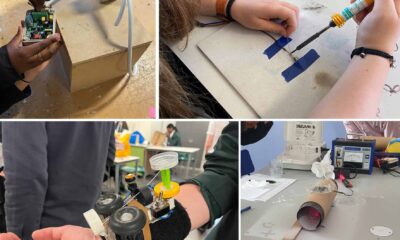Science
Study Reveals First Human Kiss Dates Back 21 Million Years

A recent study led by the University of Oxford indicates that the first human kiss may have occurred between 21 million and 16 million years ago, suggesting a more complex interaction between our ancestors and Neanderthals than previously understood. While it has long been established that Homo sapiens and Neanderthals interbred, this research posits that their interactions might have also included affectionate gestures, such as kissing.
Kissing is a behavior observed in various animal species, yet it presents an evolutionary conundrum. Scientists note that while kissing can foster social bonds, it also poses health risks due to the potential transmission of diseases. Thus, the question arises: what evolutionary advantage does kissing confer?
The findings, published in the journal Evolution and Human Behaviour, mark the first comprehensive effort to trace the evolutionary lineage of kissing by analyzing the primate family tree. Dr. Matilda Brindle, the study’s lead author and an evolutionary biologist at Oxford’s Department of Biology, stated, “This is the first time anyone has taken a broad evolutionary lens to examine kissing. Our findings add to a growing body of work highlighting the remarkable diversity of sexual behaviours exhibited by our primate cousins.”
The research suggests that both Homo sapiens and Neanderthals coexisted in Europe for a period ranging from 2,600 to 5,400 years until the last Neanderthals disappeared approximately 40,000 years ago. Previous studies have indicated a shared microbial heritage between modern humans and Neanderthals, hinting at the possibility of saliva exchange, potentially through shared food or other forms of intimate contact. This latest research implies that kissing may have been a part of their interactions.
For the purpose of this study, kissing was defined as non-aggressive, mouth-to-mouth contact that did not involve the transfer of food. The research included various primate species such as chimpanzees, bonobos, and orangutans, all of which have been observed engaging in kissing behavior. Researchers mapped kissing as an evolutionary trait onto the primate family tree, employing a complex statistical model that ran simulations 10 million times to refine their estimates.
Co-author Professor Stuart West, also from the University of Oxford, emphasized the importance of integrating evolutionary biology with behavioral data. He remarked, “By integrating evolutionary biology with behavioural data, we’re able to make informed inferences about traits that don’t fossilise – like kissing. This lets us study social behaviour in both modern and extinct species.”
The study proposes that the origins of kissing may be linked to grooming practices or the close interactions between mothers and their offspring during feeding. While the research offers insights into the evolution of kissing, the authors clarify that it does not address the underlying reasons animals engage in kissing behavior.
This exploration into the history of kissing provides a fascinating perspective on how intimate behaviors may have evolved in our ancestors, enriching our understanding of social bonds in both ancient and contemporary contexts.
-

 Entertainment3 months ago
Entertainment3 months agoAnn Ming Reflects on ITV’s ‘I Fought the Law’ Drama
-

 Entertainment4 months ago
Entertainment4 months agoKate Garraway Sells £2 Million Home Amid Financial Struggles
-

 Health3 months ago
Health3 months agoKatie Price Faces New Health Concerns After Cancer Symptoms Resurface
-

 Entertainment3 months ago
Entertainment3 months agoCoronation Street’s Carl Webster Faces Trouble with New Affairs
-

 Entertainment3 months ago
Entertainment3 months agoWhere is Tinder Swindler Simon Leviev? Latest Updates Revealed
-

 Entertainment4 months ago
Entertainment4 months agoMarkiplier Addresses AI Controversy During Livestream Response
-

 Science1 month ago
Science1 month agoBrian Cox Addresses Claims of Alien Probe in 3I/ATLAS Discovery
-

 Entertainment4 months ago
Entertainment4 months agoKim Cattrall Posts Cryptic Message After HBO’s Sequel Cancellation
-

 Entertainment2 months ago
Entertainment2 months agoOlivia Attwood Opens Up About Fallout with Former Best Friend
-

 Entertainment3 months ago
Entertainment3 months agoMasterChef Faces Turmoil as Tom Kerridge Withdraws from Hosting Role
-

 Entertainment4 months ago
Entertainment4 months agoSpeculation Surrounds Home and Away as Cast Departures Mount
-

 World2 months ago
World2 months agoCole Palmer’s Mysterious Message to Kobbie Mainoo Sparks Speculation





















